Module 3 Journey to space Unit 3 课件 (共43张PPT)
文档属性
| 名称 | Module 3 Journey to space Unit 3 课件 (共43张PPT) |
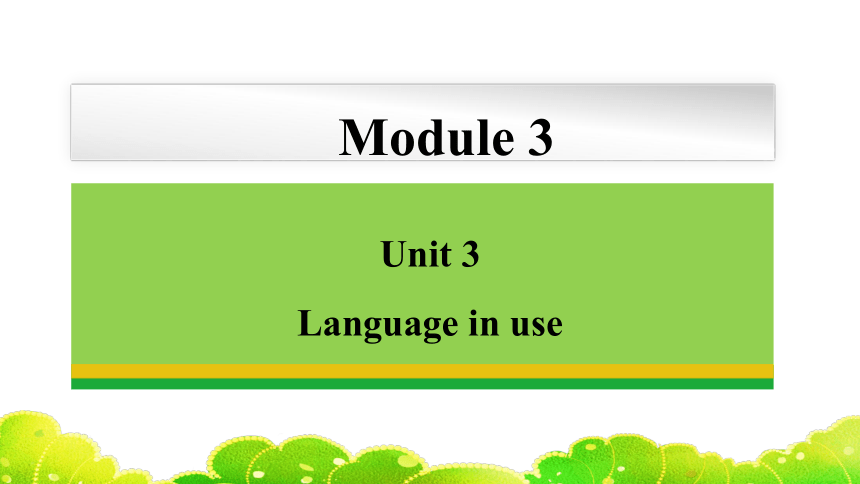
|
|
| 格式 | pptx | ||
| 文件大小 | 89.4MB | ||
| 资源类型 | 教案 | ||
| 版本资源 | 外研版 | ||
| 科目 | 英语 | ||
| 更新时间 | 2024-02-19 13:17:12 | ||
图片预览

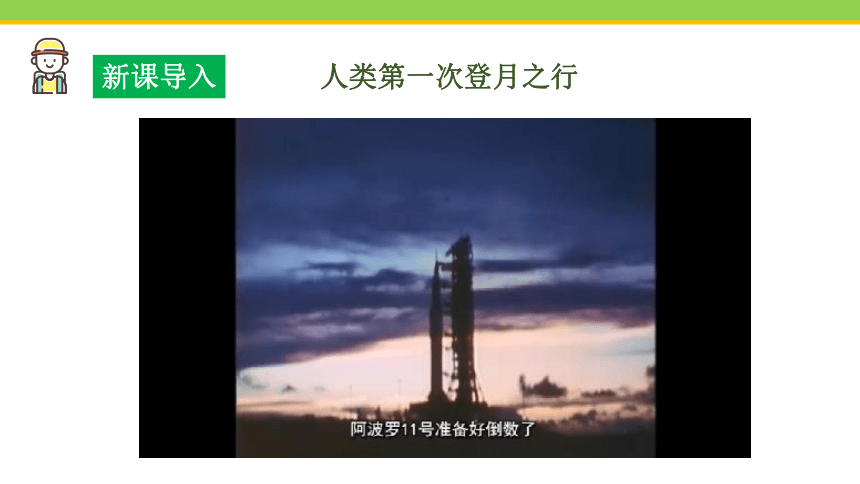
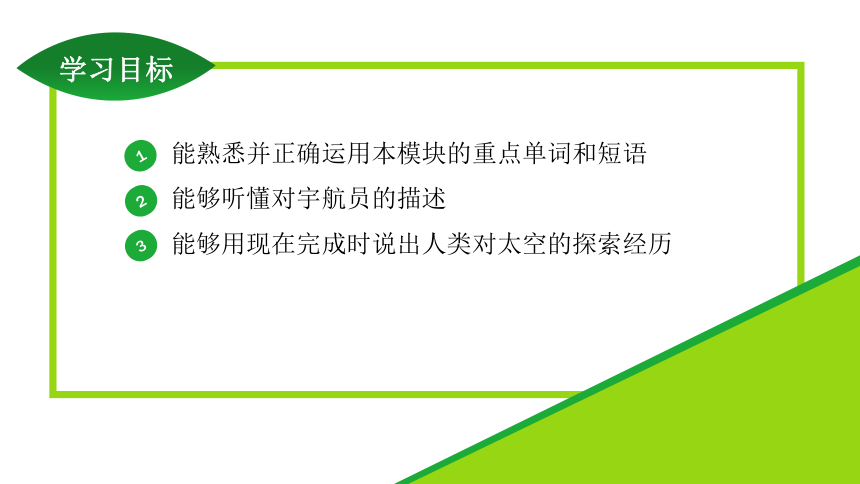
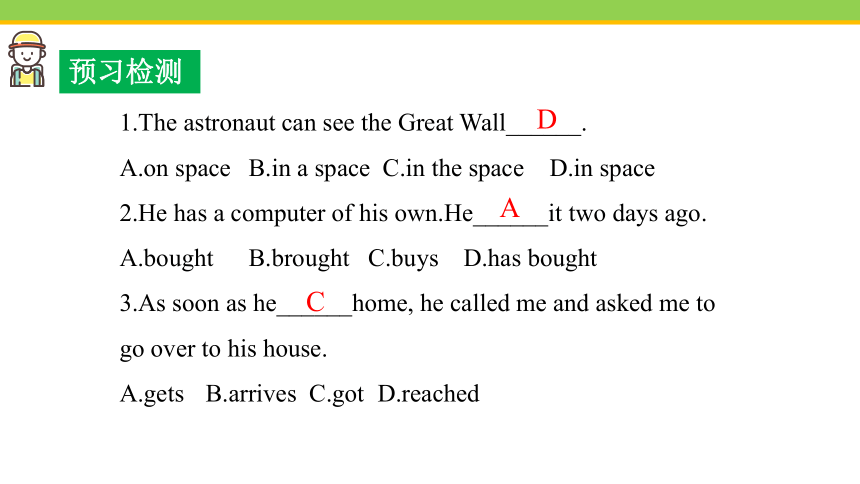

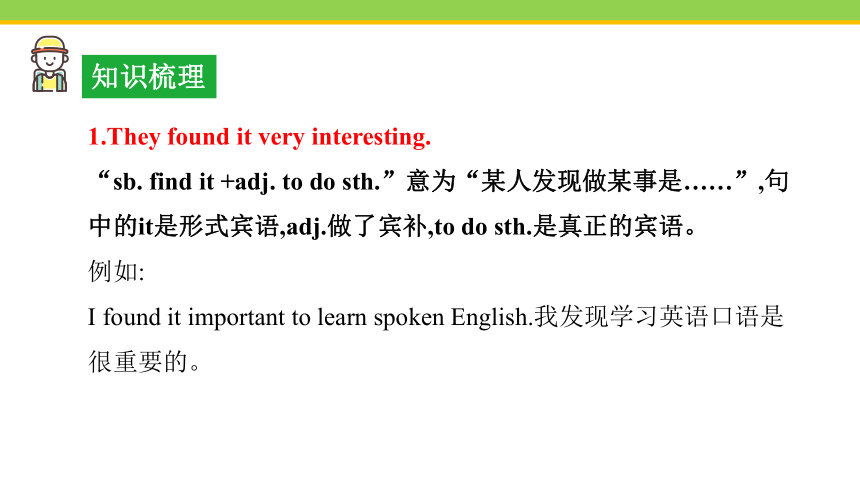
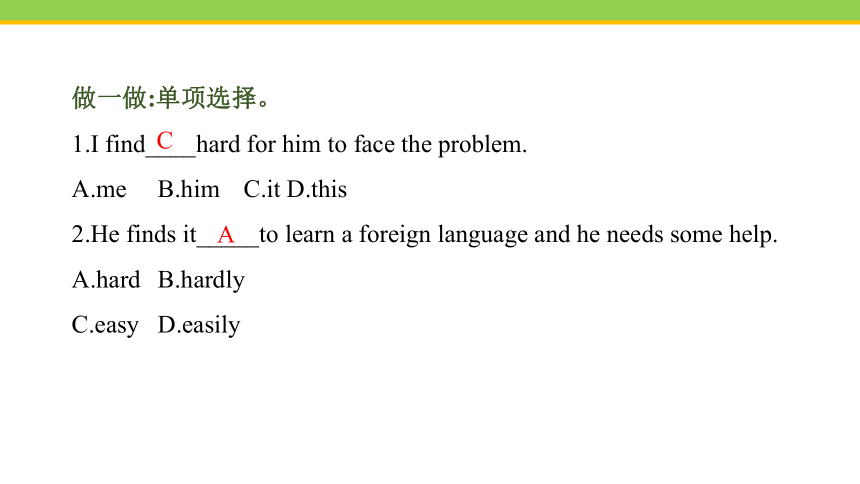
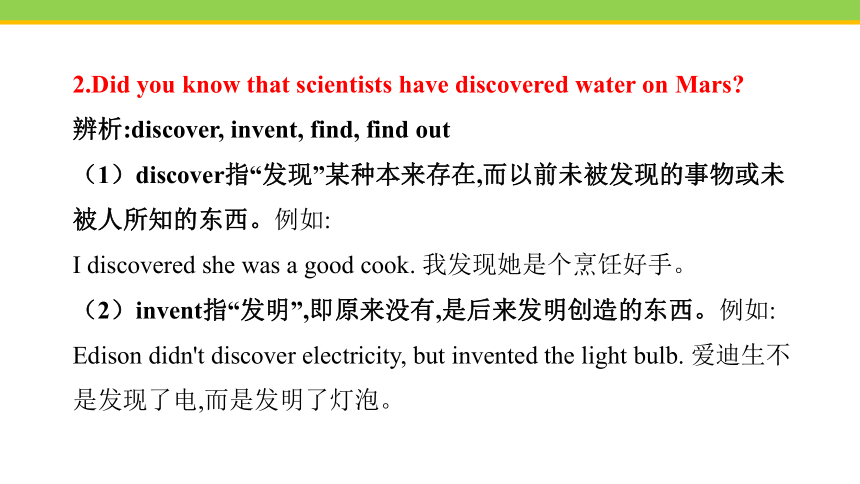
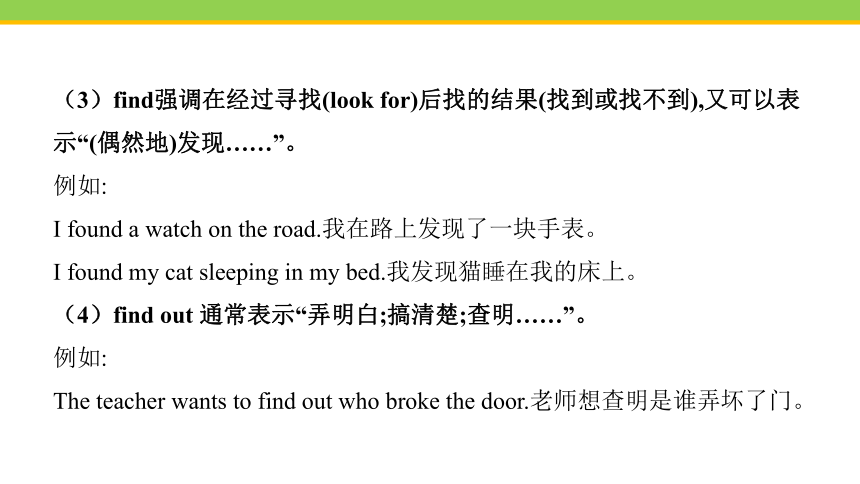
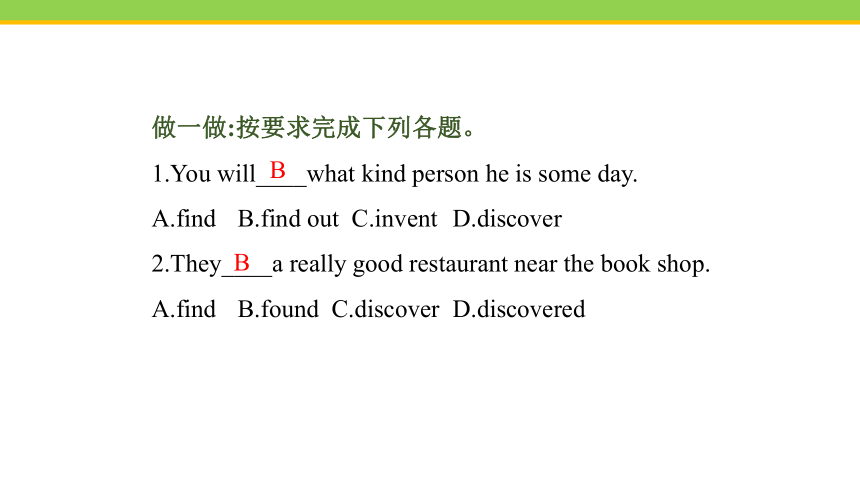
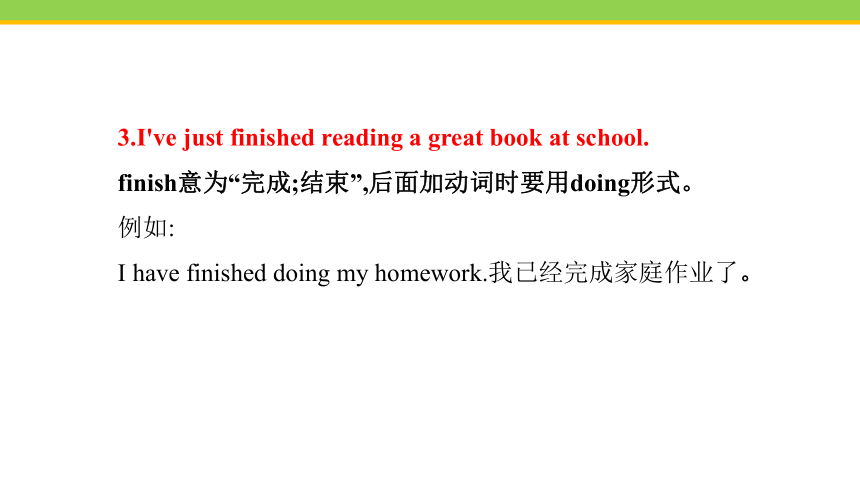
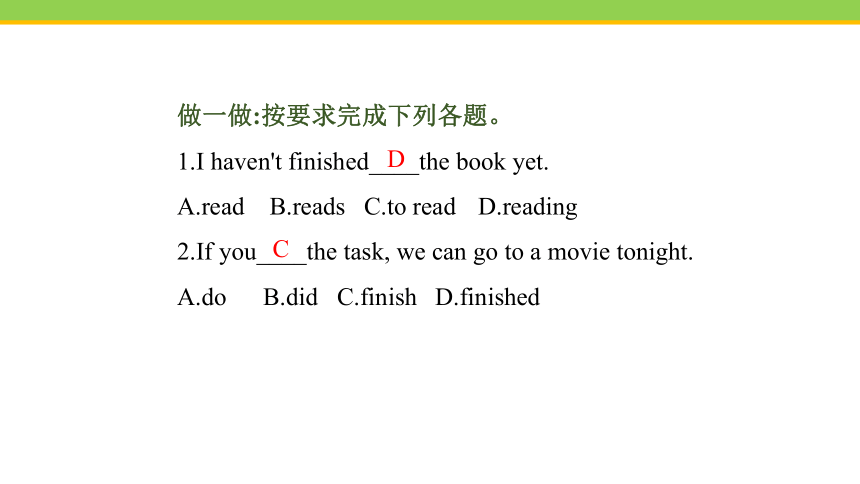
文档简介
(共43张PPT)
Module 3
Unit 3
Language in use
新课导入
人类第一次登月之行
1
能熟悉并正确运用本模块的重点单词和短语
能够听懂对宇航员的描述
能够用现在完成时说出人类对太空的探索经历
2
3
1.The astronaut can see the Great Wall______.
A.on space B.in a space C.in the space D.in space
2.He has a computer of his own.He______it two days ago.
A.bought B.brought C.buys D.has bought
3.As soon as he______home, he called me and asked me to go over to his house.
A.gets B.arrives C.got D.reached
预习检测
A
D
C
4.—Do you know who_____light bulbs
—Yes.Thomas Edison did.
A.found out B.invented C.found D.discovered
5.—Where is Bob
—He_____to Harbin for a meeting.
A.went B.has been C.has gone D.goes
C
B
知识梳理
1.They found it very interesting.
“sb. find it +adj. to do sth.”意为“某人发现做某事是……”,句中的it是形式宾语,adj.做了宾补,to do sth.是真正的宾语。
例如:
I found it important to learn spoken English.我发现学习英语口语是很重要的。
做一做:单项选择。
1.I find____hard for him to face the problem.
A.me B.him C.it D.this
2.He finds it_____to learn a foreign language and he needs some help.
A.hard B.hardly
C.easy D.easily
C
A
2.Did you know that scientists have discovered water on Mars
辨析:discover, invent, find, find out
(1)discover指“发现”某种本来存在,而以前未被发现的事物或未被人所知的东西。例如:
I discovered she was a good cook. 我发现她是个烹饪好手。
(2)invent指“发明”,即原来没有,是后来发明创造的东西。例如:
Edison didn't discover electricity, but invented the light bulb. 爱迪生不是发现了电,而是发明了灯泡。
(3)find强调在经过寻找(look for)后找的结果(找到或找不到),又可以表示“(偶然地)发现……”。
例如:
I found a watch on the road.我在路上发现了一块手表。
I found my cat sleeping in my bed.我发现猫睡在我的床上。
(4)find out 通常表示“弄明白;搞清楚;查明……”。
例如:
The teacher wants to find out who broke the door.老师想查明是谁弄坏了门。
做一做:按要求完成下列各题。
1.You will____what kind person he is some day.
A.find B.find out C.invent D.discover
2.They____a really good restaurant near the book shop.
A.find B.found C.discover D.discovered
B
B
3.I've just finished reading a great book at school.
finish意为“完成;结束”,后面加动词时要用doing形式。
例如:
I have finished doing my homework.我已经完成家庭作业了。
做一做:按要求完成下列各题。
1.I haven't finished____the book yet.
A.read B.reads C.to read D.reading
2.If you____the task, we can go to a movie tonight.
A.do B.did C.finish D.finished
D
C
现在完成时
一、现在完成时用来表示过去发生或已经完成的动作对现在造成的影响或结果。也就是说,动作或状态发生在过去但它的影响现在还存在,强调的是现在。例如:
I have already sent the photo.我已经把照片寄走了。
二、现在完成时往往与表示不确定的过去时间状语连用,如:already, yet, just, before, never等。例如:
He has already finished the work.他已经完成了工作。
三、一般过去时和现在完成时的用法区别
一般过去时通常和表示过去的时间状语连用。如:yesterday, last week, two years ago, just now, in 2002等。
现在完成时则常与just, already, ever, never, yet等副词连用。
例如:
I have seen her before, but I can not remember where.
我以前见过她,但不记得在哪了。
做一做:按要求完成下列各题。
1.—____you____your homework yet
—Yes. I______it a moment ago.
A.Did; do; finished B.Have; done; finished
C.Have; done; have finished D.Did; did; finish
2.Mary____to see the film because she____it three times.
A.won't go; saw B.won't go; will see
C.won't go; has seen D.didn't go; sees
B
C
巩固现在完成时的用法
重点探究
Language practice
I've just made a model spaceship.
Astronauts have already been to the moon.
Has it arrived yet?
We have not found life on any other planets yet.
1.Complete the news with already, just and yet.
Spaceship on Mars!
Astronauts have _______ been to the moon but they have not been to other planets. However, a spaceship has _________ arrived on Mars and it has _________ sent back photos of the red planet. Is there life on Mars We do not know _______.
already
just
already
yet
2. Look at these sentences.
The spaceship has gone to Mars.
It has gone there, but it has not come back yet.
Astronauts have been to the moon.
They went there and then they came back.
Now choose the correct answer.
1. Astronauts have been / gone to the moon and returned safely.
2. The spaceship has been / gone into space. It will travel for ten days.
3. The astronaut has been / gone to the space station. He will come back tomorrow.
4. The spaceship has been / gone to the space station. It brought back two astronauts.
3.Complete the sentences with the expressions in the box.
have / has been have / has gone
1. A spaceship ___________ to Mars. It is coming back to the earth next year.
2. Lots of astronauts ___________ to the space station. They found it very interesting.
has gone
have been
3. Some astronauts __________ to the moon twice.
4. Two British astronauts _________ to the space station. They will come back in January.
have gone
have / has been have / has gone
have been
have/has been to与have/has gone to的区别:
have/has been to表示某人“去过某地,现在已经回来了”。
have/has gone to表示某人“去某地了”,这个人已经不在这里了。
I've just _______ (watch) a great TV programme about space. Did you know that scientists have _________ (discover) water on Mars
Yes, I did. And scientists ________ (try) to find life on Mars now.
watched
discovered
are trying
Nicky
Bill
Yes, they’re looking for life but they ____________ (not find) anything yet.
There were some new photos of Mars in the newspaper today. _____ you ______ (see) them yet
haven’t found
Have
Nicky
Bill
seen
Yes. They are amazing!
Nicky
6.Complete the email with the words in the box.
been just met never read written yet
FROM:
TO:
SUBJECT:
Liu Dan
Li Fang
I have found a great book.
Dear Li Fang,
I’ve _______ finished reading a great
just
book at school. I haven’t ______ anything as good as that for a long time! It’s a story about the solar system. In the book, the writer imagines that astronauts have ________ to Mars. I’ve ______ thought about that before and I think it’s very interesting.
I haven’t ______ any famous in my life but I hope one
read
been
met
never
astronaut. I’ve ______ to a Chinese astronaut for more information about space and his experience of space travel. I hope he will write back. He hasn’t ______. Maybe he is too busy. I’m still waiting.
Best wishes,
Liu Dan
written
yet
通过以上活动,我们知道have/has been to与have/has gone to的区别:
________________________________________________________________________________________________________________________________________________________________________________________________
have/has been to表示某人“去过某地,现在已经回来了”。
have/has gone to表示某人“去某地了”,这个人已经不在这里了。
活动小结
用英语谈论太空
Complete the word map with the words and expressions in the box.
astronaut Mars spaceship space station
the earth the moon the sun
space travel
SPACE
solar system
spaceship
astronaut
space station
Mars
the sun
the earth
the moon
Now add more words about space to the word map and write five sentences.
1. We've just read a story about a space station near the sun.
2. Astronauts haven't been to the sun yet because it's too hot.
3. Spaceships are travelling in our solar system at the moment.
4. I am interested in space and the stars and planets in our galaxy.
5. I think scientists will send astronauts to Mars one day.
Possible sentences
美国宇航员模拟火星生存实验
7.Listen and complete the notes.
The astronaut joined CNSA _____ years ago.
2. He has flown in a spaceship _____times.
3. He felt ______ when he was in the spaceship.
six
two
excited
4. He has been to the space station ______.
5. The earth was blue and very __________
when he saw it from the space station.
6. He decided to be an astronaut because he
has always been _________ in space.
twice
beautiful
interested
In July 1969, Neil Armstrong became the first (1) _________ to walk on the (2)_______. People all around the world watched their televisions and waited for the (3) ______ to
9.Complete the passage with the correct form of the words in the box.
astronaut discover moon news
reach spaceship yet
astronaut
moon
news
(4) ________ the earth. We have now(5)_________ a lot more about our solar system, and we have sent (6) __________ to Mars, but no one has walked on that planet (7)_____. But I believe one day someone will!
reach
discovered
spaceships
yet
Many European languages use the names of the heavenly bodies for the days of the week. For example, in English, Saturday is named after the planet Saturn, the sixth planet from the sun. Sunday is the day of the sun, a traditional dayof rest. Monday gets its name from the moon and is the day of the moon.
Names of the days of the week
10.Work in groups. Choose a subject for example, the first moon landing or China's manned space travels. Look for some photos and information about it.
Making a poster about space travel
Making a poster about space travel
11.Write captions for the photos and use the information you found in Activity 10 to write a description of each one.
12.Give your poster a title. Put it up for your classmates to see.
通过以上活动,我们可以了解到有关太阳系的有关信息,太阳系中有:太阳 1.__________, 月亮 2.__________,地球 3._____________,火星 4._____________和土星5.___________等。同时,了解到,1969年7月,Neil Armstrong 成为人类历史上第一个在月球上行走的人。
活动小结
the sun
the moon
the earth
the Mars
the Saturn
当堂检测
1.They are talking about the_____(最新的)films and books.
2.There's a subway in my hometown,but there was______(没有一个) two years ago.
3.She and her_______(组) left for the village.
4.It was_________(不可能的) for us to agree to this.
5.We should have_________(太阳的) hot water systems.
一、根据句意及汉语提示填写单词。
latest
group
none
impossible
solar
当堂检测
1.宇航员已经去过月球了,但是没去过任何其他行星。
______________________________________________________________________________________________
2.他们发现它非常有趣。
_______________________________________________
3.你知道科学家已经在火星上发现了水吗
_______________________________________________
4.我刚刚在学校读完一本好书。
_______________________________________________
二、译一译。
Astronauts have already been to the moon but they have not been to any other planets.
They found it very interesting.
Did you know that scientists have discovered water on Mars
I've just finished reading a great book at school.
have/has been to与have/has gone to的区别:
have/has been to表示某人“去过某地,现在已经回来了”。
have/has gone to表示某人“去某地了”,这个人已经不在这里了。
本课时重要词汇:
earth, moon, news, planet, reach, yet, just, model, latest,on,discover,astronaut,
none,environment,that,solar,system,group
Module 3
Unit 3
课堂总结
Module 3
Unit 3
Language in use
新课导入
人类第一次登月之行
1
能熟悉并正确运用本模块的重点单词和短语
能够听懂对宇航员的描述
能够用现在完成时说出人类对太空的探索经历
2
3
1.The astronaut can see the Great Wall______.
A.on space B.in a space C.in the space D.in space
2.He has a computer of his own.He______it two days ago.
A.bought B.brought C.buys D.has bought
3.As soon as he______home, he called me and asked me to go over to his house.
A.gets B.arrives C.got D.reached
预习检测
A
D
C
4.—Do you know who_____light bulbs
—Yes.Thomas Edison did.
A.found out B.invented C.found D.discovered
5.—Where is Bob
—He_____to Harbin for a meeting.
A.went B.has been C.has gone D.goes
C
B
知识梳理
1.They found it very interesting.
“sb. find it +adj. to do sth.”意为“某人发现做某事是……”,句中的it是形式宾语,adj.做了宾补,to do sth.是真正的宾语。
例如:
I found it important to learn spoken English.我发现学习英语口语是很重要的。
做一做:单项选择。
1.I find____hard for him to face the problem.
A.me B.him C.it D.this
2.He finds it_____to learn a foreign language and he needs some help.
A.hard B.hardly
C.easy D.easily
C
A
2.Did you know that scientists have discovered water on Mars
辨析:discover, invent, find, find out
(1)discover指“发现”某种本来存在,而以前未被发现的事物或未被人所知的东西。例如:
I discovered she was a good cook. 我发现她是个烹饪好手。
(2)invent指“发明”,即原来没有,是后来发明创造的东西。例如:
Edison didn't discover electricity, but invented the light bulb. 爱迪生不是发现了电,而是发明了灯泡。
(3)find强调在经过寻找(look for)后找的结果(找到或找不到),又可以表示“(偶然地)发现……”。
例如:
I found a watch on the road.我在路上发现了一块手表。
I found my cat sleeping in my bed.我发现猫睡在我的床上。
(4)find out 通常表示“弄明白;搞清楚;查明……”。
例如:
The teacher wants to find out who broke the door.老师想查明是谁弄坏了门。
做一做:按要求完成下列各题。
1.You will____what kind person he is some day.
A.find B.find out C.invent D.discover
2.They____a really good restaurant near the book shop.
A.find B.found C.discover D.discovered
B
B
3.I've just finished reading a great book at school.
finish意为“完成;结束”,后面加动词时要用doing形式。
例如:
I have finished doing my homework.我已经完成家庭作业了。
做一做:按要求完成下列各题。
1.I haven't finished____the book yet.
A.read B.reads C.to read D.reading
2.If you____the task, we can go to a movie tonight.
A.do B.did C.finish D.finished
D
C
现在完成时
一、现在完成时用来表示过去发生或已经完成的动作对现在造成的影响或结果。也就是说,动作或状态发生在过去但它的影响现在还存在,强调的是现在。例如:
I have already sent the photo.我已经把照片寄走了。
二、现在完成时往往与表示不确定的过去时间状语连用,如:already, yet, just, before, never等。例如:
He has already finished the work.他已经完成了工作。
三、一般过去时和现在完成时的用法区别
一般过去时通常和表示过去的时间状语连用。如:yesterday, last week, two years ago, just now, in 2002等。
现在完成时则常与just, already, ever, never, yet等副词连用。
例如:
I have seen her before, but I can not remember where.
我以前见过她,但不记得在哪了。
做一做:按要求完成下列各题。
1.—____you____your homework yet
—Yes. I______it a moment ago.
A.Did; do; finished B.Have; done; finished
C.Have; done; have finished D.Did; did; finish
2.Mary____to see the film because she____it three times.
A.won't go; saw B.won't go; will see
C.won't go; has seen D.didn't go; sees
B
C
巩固现在完成时的用法
重点探究
Language practice
I've just made a model spaceship.
Astronauts have already been to the moon.
Has it arrived yet?
We have not found life on any other planets yet.
1.Complete the news with already, just and yet.
Spaceship on Mars!
Astronauts have _______ been to the moon but they have not been to other planets. However, a spaceship has _________ arrived on Mars and it has _________ sent back photos of the red planet. Is there life on Mars We do not know _______.
already
just
already
yet
2. Look at these sentences.
The spaceship has gone to Mars.
It has gone there, but it has not come back yet.
Astronauts have been to the moon.
They went there and then they came back.
Now choose the correct answer.
1. Astronauts have been / gone to the moon and returned safely.
2. The spaceship has been / gone into space. It will travel for ten days.
3. The astronaut has been / gone to the space station. He will come back tomorrow.
4. The spaceship has been / gone to the space station. It brought back two astronauts.
3.Complete the sentences with the expressions in the box.
have / has been have / has gone
1. A spaceship ___________ to Mars. It is coming back to the earth next year.
2. Lots of astronauts ___________ to the space station. They found it very interesting.
has gone
have been
3. Some astronauts __________ to the moon twice.
4. Two British astronauts _________ to the space station. They will come back in January.
have gone
have / has been have / has gone
have been
have/has been to与have/has gone to的区别:
have/has been to表示某人“去过某地,现在已经回来了”。
have/has gone to表示某人“去某地了”,这个人已经不在这里了。
I've just _______ (watch) a great TV programme about space. Did you know that scientists have _________ (discover) water on Mars
Yes, I did. And scientists ________ (try) to find life on Mars now.
watched
discovered
are trying
Nicky
Bill
Yes, they’re looking for life but they ____________ (not find) anything yet.
There were some new photos of Mars in the newspaper today. _____ you ______ (see) them yet
haven’t found
Have
Nicky
Bill
seen
Yes. They are amazing!
Nicky
6.Complete the email with the words in the box.
been just met never read written yet
FROM:
TO:
SUBJECT:
Liu Dan
Li Fang
I have found a great book.
Dear Li Fang,
I’ve _______ finished reading a great
just
book at school. I haven’t ______ anything as good as that for a long time! It’s a story about the solar system. In the book, the writer imagines that astronauts have ________ to Mars. I’ve ______ thought about that before and I think it’s very interesting.
I haven’t ______ any famous in my life but I hope one
read
been
met
never
astronaut. I’ve ______ to a Chinese astronaut for more information about space and his experience of space travel. I hope he will write back. He hasn’t ______. Maybe he is too busy. I’m still waiting.
Best wishes,
Liu Dan
written
yet
通过以上活动,我们知道have/has been to与have/has gone to的区别:
________________________________________________________________________________________________________________________________________________________________________________________________
have/has been to表示某人“去过某地,现在已经回来了”。
have/has gone to表示某人“去某地了”,这个人已经不在这里了。
活动小结
用英语谈论太空
Complete the word map with the words and expressions in the box.
astronaut Mars spaceship space station
the earth the moon the sun
space travel
SPACE
solar system
spaceship
astronaut
space station
Mars
the sun
the earth
the moon
Now add more words about space to the word map and write five sentences.
1. We've just read a story about a space station near the sun.
2. Astronauts haven't been to the sun yet because it's too hot.
3. Spaceships are travelling in our solar system at the moment.
4. I am interested in space and the stars and planets in our galaxy.
5. I think scientists will send astronauts to Mars one day.
Possible sentences
美国宇航员模拟火星生存实验
7.Listen and complete the notes.
The astronaut joined CNSA _____ years ago.
2. He has flown in a spaceship _____times.
3. He felt ______ when he was in the spaceship.
six
two
excited
4. He has been to the space station ______.
5. The earth was blue and very __________
when he saw it from the space station.
6. He decided to be an astronaut because he
has always been _________ in space.
twice
beautiful
interested
In July 1969, Neil Armstrong became the first (1) _________ to walk on the (2)_______. People all around the world watched their televisions and waited for the (3) ______ to
9.Complete the passage with the correct form of the words in the box.
astronaut discover moon news
reach spaceship yet
astronaut
moon
news
(4) ________ the earth. We have now(5)_________ a lot more about our solar system, and we have sent (6) __________ to Mars, but no one has walked on that planet (7)_____. But I believe one day someone will!
reach
discovered
spaceships
yet
Many European languages use the names of the heavenly bodies for the days of the week. For example, in English, Saturday is named after the planet Saturn, the sixth planet from the sun. Sunday is the day of the sun, a traditional dayof rest. Monday gets its name from the moon and is the day of the moon.
Names of the days of the week
10.Work in groups. Choose a subject for example, the first moon landing or China's manned space travels. Look for some photos and information about it.
Making a poster about space travel
Making a poster about space travel
11.Write captions for the photos and use the information you found in Activity 10 to write a description of each one.
12.Give your poster a title. Put it up for your classmates to see.
通过以上活动,我们可以了解到有关太阳系的有关信息,太阳系中有:太阳 1.__________, 月亮 2.__________,地球 3._____________,火星 4._____________和土星5.___________等。同时,了解到,1969年7月,Neil Armstrong 成为人类历史上第一个在月球上行走的人。
活动小结
the sun
the moon
the earth
the Mars
the Saturn
当堂检测
1.They are talking about the_____(最新的)films and books.
2.There's a subway in my hometown,but there was______(没有一个) two years ago.
3.She and her_______(组) left for the village.
4.It was_________(不可能的) for us to agree to this.
5.We should have_________(太阳的) hot water systems.
一、根据句意及汉语提示填写单词。
latest
group
none
impossible
solar
当堂检测
1.宇航员已经去过月球了,但是没去过任何其他行星。
______________________________________________________________________________________________
2.他们发现它非常有趣。
_______________________________________________
3.你知道科学家已经在火星上发现了水吗
_______________________________________________
4.我刚刚在学校读完一本好书。
_______________________________________________
二、译一译。
Astronauts have already been to the moon but they have not been to any other planets.
They found it very interesting.
Did you know that scientists have discovered water on Mars
I've just finished reading a great book at school.
have/has been to与have/has gone to的区别:
have/has been to表示某人“去过某地,现在已经回来了”。
have/has gone to表示某人“去某地了”,这个人已经不在这里了。
本课时重要词汇:
earth, moon, news, planet, reach, yet, just, model, latest,on,discover,astronaut,
none,environment,that,solar,system,group
Module 3
Unit 3
课堂总结
同课章节目录
- Module 1 Feelings and impressions
- Unit 1 It smells delicious.
- Unit 2 I feel nervous when I speak Chinese .
- Unit 3 Language in use
- Module 2 Experiences
- Unit 1 I've also entered lots of speaking competi
- Unit 2 They have seen the Pyramids.
- Unit 3 Language in use
- Module 3 Journey to space
- Unit 1 Has it arrived yet?
- Unit 2 We have not found life on any other planet
- Unit 3 Language in use
- Module 4 Seeing the docto
- Unit 1 I haven't done much exercise since I got m
- Unit 2 We have played football for a year now
- Unit 3 Language in use
- Module 5 Cartoons
- Unit 1 It's time to watch a cartoon.
- Unit 2 Tintin has been popular for over eighty yea
- Unit 3 Language in use
- Revision module A
- Module 6 Hobbies
- Unit 1 Do you collect anything ?
- Unit 2 Hobbies can make you grow as a person.
- Unit 3 Language in use
- Module 7 Summer in Los Angeles
- Unit 1 Please write to me and send me some photos
- Unit 2 Fill out a form and come to learn English
- Unit 3 Language in use
- Module 8 Time off
- Unit 1 I can hardly believe we are in the city ce
- Unit 2 We thought somebody was moving about
- Unit 3 Language in use
- Module 9 Friendship
- Unit 1 Could I ask if you've mentioned this to he
- Unit 2 I believe that the world is what you think
- Unit 3 Language in use
- Module 10 On the radio
- Unit 1 I hope that you can join us one day
- Unit 2 It seemed that they were speaking to me in
- Unit 3 Language in use
- Revision module B
